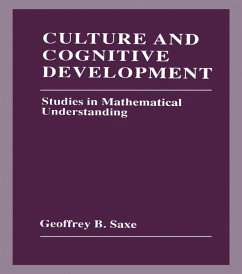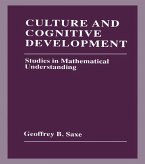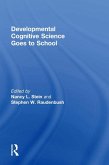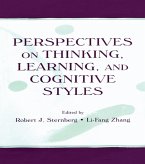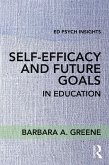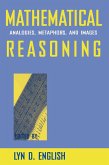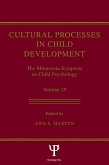Culture and Cognitive Development presents the latest research by Dr. Geoffrey Saxe on this issue. In examinations of the mathematical understandings of child candy sellers in an urban center in northeastern Brazil, Dr. Saxe finds sharp contrasts between mathematics as practiced in school and in real-world settings. In this unique research project he presents a penetrating conceptual treatment of the interplay between culture and cognitive development, filling a void in current research literature.
Subjects examined include:
the interplay between sociocultural and cognitive developmental processes
the differences between math knowledge learned in and out of the classroom
the ways math learning in the classroom is modified by children's out-of-school mathematics and, correspondingly, how practical out-of-school mathematics use is modified by formal education
Dieser Download kann aus rechtlichen Gründen nur mit Rechnungsadresse in A, B, BG, CY, CZ, D, DK, EW, E, FIN, F, GR, HR, H, IRL, I, LT, L, LR, M, NL, PL, P, R, S, SLO, SK ausgeliefert werden.
Contemporary Psychology
"...a valuable example of the empirical analysis of the role of culture in cognitive development....a welcome contribution to both the Piagetian constructivist and Vygotskian literatures because it provides a clear model for the empirical analysis of the joint participation of sociocultural and personal processes in construction of meaning through a practical integration of Piaget's constructivism with Vygotsky's dialectical method....As Saxe's analysis makes apparent, it is only when constructive processes are conceived in terms of participation of multiple psychological, social, and cultural functions in the construction of new cognitive skills, that an understanding of contextual channelling and alternative developmental pathways really emerges."
Human Development
"....this book could well achieve `cult' status. It is a seductive book that will appeal to many readers at different levels....Because of the research focus on learning and cognitive development, the three components (the subjects, the tasks, and their analyses) are chosen to `catch' the dynamics of cognitive change and growth. The choices, in my view, are remarkably successful....It is a fascinating and rare combination of psychological and ethnographic inquiry styles....As Chevallard (1990) says, `The problems of mathematics education and culture should be everyone's concern'(p.26), and Saxe's book demonstrates convincingly the truth of that statement."
Journal for Research in Mathematics Education
"Clearly of interest to mathematicians, this book could also be an important addition to the study of cognitive development and research design."
Harvard Educational Review
"...the focal problems of learning in mathematics provide excellent case studies for what are demonstrably the more fundamental issues of mind-society relations...Saxe's writing has a clarity and crisp tone, and the analysis of data he provides in the context of illuminating the utility of the research framework is robust and well-argued. Most importantly, one can imagine from the detailed example he offers how one might apply the theoretical and research framework to culture-cognition relations for other content domains."
Roy D. Pea
Institute for Research on Learning in Educational Researcher

